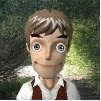

Newgrass, spacegrass -- bluegrass went through a lot of permutations during the Seventies. Groups like The Seldom Scene and New Grass Revival expanded the material and performing styles of bluegrass, offering more rock influences and band-composed material. Never been much of a fan...
Another offshoot was influenced by mandolinist David Grisman's work with Jerry Garcia (Old and In the Way) and especially his own melding of bluegrass and Django Reinhardt gypsy jazz, as revealed in the classic David Grisman Quintet. My man Tony Rice, featured on the Quintet album, carried on with his version which he dubbed 'spacegrass'.


As much as I enjoy Grisman, I like Tony's albums a little more because Tony's lightning guitar runs are featured more prominently. Tony is the master of the clean line, no matter how fast he plays.
Norman Blake is also a guitar master, but he inclines more toward 'old-time' music, which is more string band blues and country rather than bluegrass. Norman writes a lot of his own material in a kind of 'new Southern old-time' style, and while his nasal vocals takes some getting used to, a lot of his music sounds like traditional front porch picking, best exemplified in "Whiskey Before Breakfast".



The 2 albums that Norman and Tony made together disappointed me at first because I was expecting all sorts of dueling acoustic guitar pyrotechnics, but these guys are more subtle than that. Even though their own work is very different from each other, they find common ground that really is a sublime pleasure to hear.


Tony Rice seems like he'll play with just about anybody, and two of my favorite of his collaborations show his range of styles. "Skaggs and Rice" is a collection of 'brother duets', high-harmony acoustic gospel. Tony's rich baritone melds well with the high lonesome sound of Ricky Skagg's bluegrass tenor. "The Pizza Tapes" brings it all full circle: David Grisman brings his buddy Tony along for a relaxed jam session with Jerry Garcia. Their version of Miles Davis' "So What" is genius, and the infectious enthusiasm is palpable. The noodling that precedes some of the tracks influenced much of Tony's own "Unit of Measure" album, which concludes with a live recording of a fiery bluegrass breakdown by Tony's best group.



















































